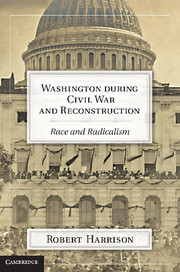Book contents
- Frontmatter
- Contents
- Abbreviations
- Foreword
- 1 Introduction
- 2 Wartime Washington
- 3 The Freedmen's Bureau in the District of Columbia
- 4 Congressional Reconstruction in the District of Columbia
- 5 Reconstructing the City Government
- 6 Race, Radicalism, and Reconstruction
- 7 A City and a State
- 8 From Biracial Democracy to Direct Rule
- 9 Reconstruction in the Nation's Capital
- Index
- References
5 - Reconstructing the City Government
Published online by Cambridge University Press: 05 February 2012
- Frontmatter
- Contents
- Abbreviations
- Foreword
- 1 Introduction
- 2 Wartime Washington
- 3 The Freedmen's Bureau in the District of Columbia
- 4 Congressional Reconstruction in the District of Columbia
- 5 Reconstructing the City Government
- 6 Race, Radicalism, and Reconstruction
- 7 A City and a State
- 8 From Biracial Democracy to Direct Rule
- 9 Reconstruction in the Nation's Capital
- Index
- References
Summary
Introduction
During the debate on black suffrage in the District of Columbia, a number of congressmen expressed the opinion, widespread among Republicans, that the government of the capital left a lot to be desired. “Is there a worse-governed city in all the Republic?” asked Representative James F. Wilson. Its manifest defects – the shabby condition of its streets, the feeble quality of its street lighting, the insufficiency of its water supply, the inadequacy of its sewers, the unwholesome state of the Washington City Canal, the lack of dedicated school buildings, and the paucity of railroad communications – could all be laid at the door of an unreconstructed city government, steeped in its lazy, unambitious, and quintessentially southern habits. What was needed was a burst of Yankee energy to haul the city out of its slough of complacency, its hopeless inertia, and the only way to achieve that was to install a Republican government that would not only protect the rights of all its citizens but also impart a new vigor to municipal affairs. “There is no remedy for the complaints and needs of the District at once so simple and so just as impartial suffrage,” pronounced the Daily Morning Chronicle in July 1866. Although the primary purpose of congressional Republicans in introducing black suffrage in the District of Columbia was to lay down a marker for their broader Reconstruction project, they were not unaware of the positive benefits that would flow from the reformation of local government in the nation's capital. During the late 1860s, congressional Republicans and their local allies acted to bring about such a reformation, although, as we shall see, with uneven results. Only after the apparent failure of that reconstruction project did they begin to look for other solutions to the problem of governing the capital.
- Type
- Chapter
- Information
- Washington during Civil War and ReconstructionRace and Radicalism, pp. 150 - 183Publisher: Cambridge University PressPrint publication year: 2011



